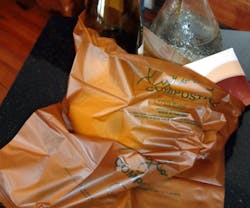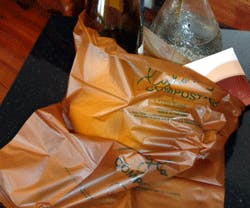If your kitchen is anything like ours, it’s overflowing with plastic bags.
We have so many plastic bags, in fact, that we set up a bin in the kitchen pantry for the sole purpose of storing plastic bags. In the past, we’ve used plastic bags to store plastic bags.
The reason why my wife and I are so reluctant to toss them in the garbage – and why, more and more, we bring reusable cloth bags to the grocery store – is because of their lifespan. Every time I’m tempted to throw them in the trash, I can’t help but picture millions upon millions of these plastic bags dotting our landfills and flapping in the breeze – for eternity.
That’s why I was especially intrigued by some news out of Virginia Polytechnic Institute and State University. Virginia Tech professor Wolfgang Glasser serves as chief scientific officer for a company called cycleWood Solutions Inc., which is working on “a sustainable solution to conventional single-use plastic bags.”
Glasser, a professor emeritus of sustainable biomaterials, says he hesitated to join the Fayetteville, Ark.-based startup company at first. But then he realized that cycleWood Solutions could help bring his dream to fruition: developing biodegradable plastics from a plentiful natural resource.
That plentiful natural resource is lignin, a natural polymer that helps form the cell walls of plants.
Lignin is a compound of plant cell walls that is discarded in the papermaking process. Glasser began working with it because it was plentiful and cheap. It could be used to make “green” polymers – those from a renewable source rather than from petroleum. He worked with IBM to make green circuit boards, for instance.
“My ‘ah ha’ moment came when, in addition to viewing it from a resource viewpoint, I realized its environmental benefits,” Glasser recalls. “It could be compostable. Plastic bags and bottles needn’t last forever.”
cycleWood has created and tested a number of products, including the XyloBag, which biodegrades in about 150 days in composting operations, according to the company. The process is expedited by the structure of the polymer, the composting process and the addition of another biodegradable polymer with the lignin.
“Lignin gives the plastic the needed strength,” says Glasser.
Hopefully, this is just the prologue to cycleWood’s story. The company says it’s on “the cusp of commercialization,” and it’s working with its suppliers and manufacturing partners to produce “pilot-scale production volumes” for specific customer applications.
“Concurrently, we are moving toward commercial volumes to support larger customers,” cycleWood explains on its website.
It’s encouraging to know that someday we might be able to put our groceries (and trash) in bags that don’t outlive us. At the very least, it should free up some space in our pantry.
About the Author
Josh Cable Blogger
Senior Editor
Josh Cable is senior editor of EHS Today, a Penton publication. In his nearly 15 years as a journalist, he has covered a wide range of topics, including banking and finance, occupational safety and health, government purchasing and U.S. manufacturing. As a former editorial-staff member of Penton’s IndustryWeek and Occupational Hazards, he has toured dozens of manufacturing facilities, establishing himself as a subject-matter expert in world-class production, quality and safety systems.

